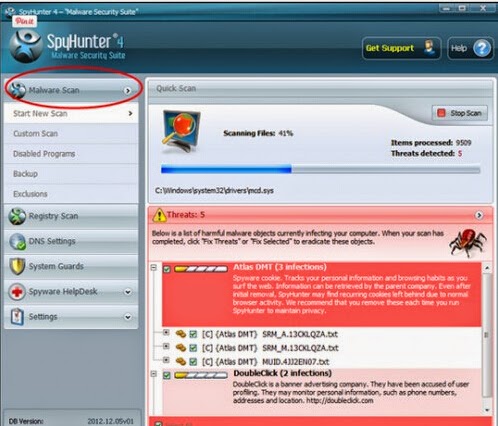What is $recycle.bin Virus? Is it the feature which provides a safety net when deleting files or folders in Windows? What is different with Recycle Bin (Recycler)? How could I remove it from my computer?You are welcome to follow the removal guide listed below.
>> Free Download Scanner to Detect $recycle.bin Virus >> BEST WAY TO KEEP PC SAFE AND PROTECT AGAINST UPCOMING THREATS WITH SPYHUNTER
What is $recycle.bin Virus
$recycle.bin Virus is dangerous malware which stop your antivirus software. So you cannot uninstall this virus by your antivirus program. You may be very familiar with
Recycle Bin (Recycler) which we often use it as a place when deleting files or folders in Windows. And different system has the different location of the Recycle Bin (Recycler) depending on the operating system and file system used. The Recycler folder contains a Recycle Bin directory for each registered user on the computer. So users thought $recycle.bin as a part of Recycler folder and they may keep this virus on their computers. However, $recycle.bin is totally different with the Recycler, and it is a Trojan virus which can imitate target computer without your permission. Then it will do a lot evil things on internal system, and it attack its host files and DNS settings. Which result into computer freezing and file missing problems.
Usually,$Recycle.Bin Virus can easily break out firewalls and disable your antivirus programs such as Norton and Malwarebytes' Anti-Malware. Even this virus could be scanned by antivirus applications, but it cannot delete by them. When your Windows launches each time, this virus turn up at the same time.
In generally, it can modify your browser settings and Windows registries, so, attacked computer is forcedly redirected to some dangerous pages and websites randomly. This virus drops various harmful codes to pages and websites, when visitors view them, this Trojan virus and other marware will come into those visitors’ system. The worse thing is that $Recycle.Bin Virus is designed by cyber criminals who have techs to remotely control victims’ computers and then connect to their system. And then steal privacy financial data, such as bank accounts, login accounts. Moreover, this virus can get into target computer automatically. Firstly, opening a spam attachments, downloading unsafe freeware, visiting illicit websites. Secondly, it is aways bundled with other marware programs, when you update or download any of them, this also contain on those actions.
Damages caused by $Recycle.Bin Virus
A: It penetrates into computer without any recognition;
B: Others horrible threats can be bundled with this virus;
C: Your personal data like bank account and passwords would be in high risk of exposure to the open;
D: It may redirect the browser to unwanted websites that contain more viruses or spywares;E: It will degrade the computer performance significantly and crash down the system randomly.
Why my Norton and Malwarebytes' Anti-Malware cannot work?
$Recycle.Bin Virus can easily break out firewalls and disable your antivirus programs such as Norton and Malwarebytes' Anti-Malware. So manually removal is the best and effective way to get rid of this virus completely from your computer.
$Recycle.Bin Virus step-by-step manual removal instructions
Solution One: get rid of $Recycle.Bin Virus manually
Before performing the manual removal of $Recycle.Bin Virus, reboot your computer and before Windows interface loads, press F8 key constantly. Choose "Safe Mode with Networking” option, and then press Enter key. System will load files and then get to the desktop in needed option.
Before performing the manual removal of $Recycle.Bin Virus, reboot your computer and before Windows interface loads, press F8 key constantly. Choose "Safe Mode with Networking” option, and then press Enter key. System will load files and then get to the desktop in needed option.
1. Launch the Task Manager by pressing keys Ctrl+Alt+Del or Ctrl+Shift+Esc at the same time, search for $Recycle.Bin Virus processes and right-click to end them.
2. Open Control Panel in Start menu and search for Folder Options. When you’re in Folder Options window, please click on its View tab, check Show hidden files and folders and uncheck Hide protected operating system files (Recommended) and then press OK.
3. Tap Windows+R keys together to pop up the Run box, type in regedit and hit OK to open Registry Editor; then find out the following $Recycle.Bin Virus registry entries and delete:
C:\RECYCLER\S-1-5-21-0243336031-4052116379-881863308-0851\vse432.exe\Infected:$Recycle.Bin
C:\RECYCLER\S-1-5-21-3497612302-3102775374-3015387129-1005\Dc1.exe\Infected: Backdoor.$Recycle.Bin
C:\RECYCLER\S-1-5-21-3497612302-3102775374-3015387129-1005\Dc5.exe\Infected: Backdoor$Recycle.Bin.hpz
%UserProfile%\[random].exe%ProgramFiles%\Internet Explorer\Connection Wizard\[random]
C:\windows\system32\SearchFilterHost.exe
C:\windows\system32\SearchProtocolHost.exe
C:\windows\system32\consent.exe
C:\windows\System32\cscript.exe
C:\windows\system32\wbem\unsecapp.exe
C:\windows\system32\wbem\wmiprvse.exe
C:\windows\system32\svchost.exe -k NetworkServiceNetworkRestricted
C:\windows\system32\svchost.exe -k LocalServiceAndNoImpersonation
C:\windows\system32\SearchProtocolHost.exe
C:\windows\system32\consent.exe
C:\windows\System32\cscript.exe
C:\windows\system32\wbem\unsecapp.exe
C:\windows\system32\wbem\wmiprvse.exe
C:\windows\system32\svchost.exe -k NetworkServiceNetworkRestricted
C:\windows\system32\svchost.exe -k LocalServiceAndNoImpersonation
SpyHunter is a powerful, real-time anti-spyware application that designed to help computer users to clean up the infections like worms, Trojans, rootkits, rogues, dialers, spyware,etc. It is important to note that SpyHunter removal tool works well and should run alongside existing security programs without any conflicts.
Step one: Click the icon to download SpyHunter removal tool
Follow the instructions to install SpyHunter removal tool



Step two: After the installation, run SpyHunter and click “Malware Scan” button to have a full or quick scan on your PC

Step three: Select the detected malicious files after your scanning and click "Remove" button to clean up all viruses.






No comments:
Post a Comment